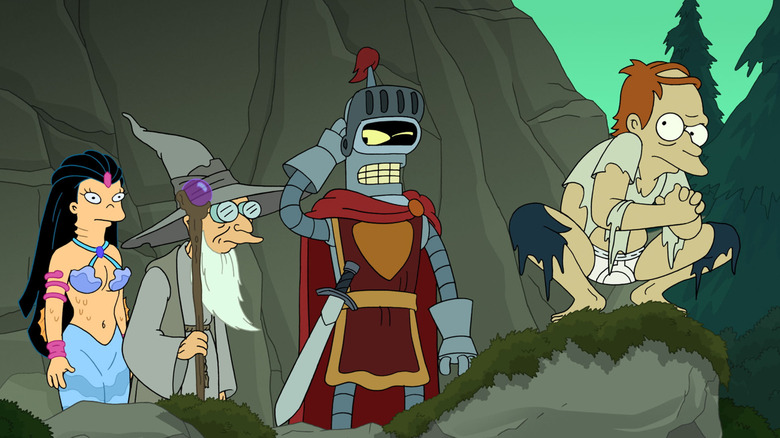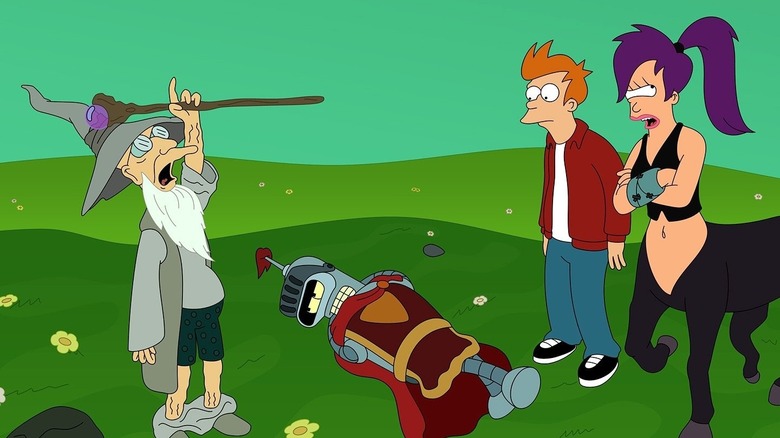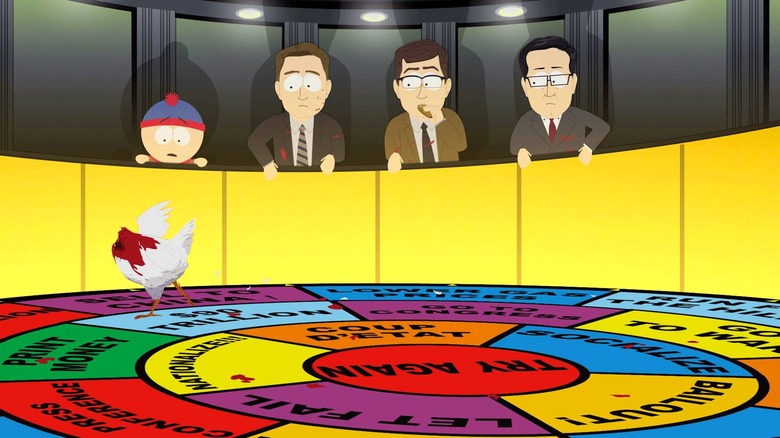The 2008 Financial Crisis Forced A Last-Minute Futurama Rewrite
A big issue with most animated shows is that they take a long time to make, so topical humor is inherently risky. "Futurama" has learned this the hard way lately in its new season on Hulu, where it centered nearly half of its episodes poking fun at social issues of 2021-2022, most of which had felt played out by the time the season actually aired in 2023. That Bitcoin episode might've been a classic if it had come out two years ago, but now? Our patience has run thin on the subject.
The 2008 film "Bender's Game," which is split into four parts on Hulu and listed in season 6, almost had a similar issue. The script originally had a joke involving the American dollar, only for a certain economic crisis to quickly age the joke. As co-creator David X. Cohen explained in the behind-the-scenes commentary, there was originally a joke where Professor Farnsworth is explaining the rules of this new Dungeons & Dragons universe the characters are in. He tells them how the money there works: "It's like real life, but if you have a dollar it's really only worth 75 cents. It's like Canada."
This might not sound that funny, but one must remember that the late 2000s were filled with American TV shows throwing in random shots at Canada for no apparent reason. This was around the same time "How I Met Your Mother" introduced the world to the "Canadians are scared of the dark" joke, and where "South Park" was having a bunch of silly Canadians go on strike despite not actually having any concrete demands. Unfortunately for these American TV writers, karma had another thing coming.
Canada strikes back
It turns out, the movie's random currency dig towards America's hat would become obsolete within a matter of months. One of the many victims of The Great Recession, which began in 2007 and took several years to fully end, was the value of the American dollar. In September 2007, the U.S. dollar's value had plummeted to the point where a Canadian loonie was suddenly worth more for the first time since the 1970s. America returned on top for a bit in 2008, but Canada again reigned supreme for a lot of 2010-2013 as well.
Today the US Dollar still remains "the linchpin of the global economy," but back in 2008, it didn't seem guaranteed that this would stay true forever. "Suddenly [CAD] was worth more than the US dollar and the joke just kind of became a national embarrassment to the United States," David Cohen explained, "so Matt [Groening] and I actually rewrote that joke at the last minute to have it make a lick of sense." He didn't say what he replaced the line with, and in the finished version of "Bender's Game" there's no real mention of currency. In the end, it seems like they did the smart thing of just not mentioning much about the American economy at all. When the TV series returned in 2010, there wasn't any strong commentary on the recession either.
Because of the nature of an animated sitcom's production times, "Futurama" is not alone with its surprisingly sparse commentary on the game-changing recession. You would not have guessed anything unusual was going on at the time by watching "The Simpsons," for instance, or even "Family Guy," which had always been more blunt with its social commentary.
Did any animated show comment on the recession?
Instead, the most up-to-date social commentary from the era came from "South Park," which creates a fun little horrifying time capsule for what the worst of the recession was like in their 2009 episode "Margaritaville." It's the episode that gave us the famous "Annnnnd it's gone" meme, and which vividly depicted the widespread sense of dread and confusion people were feeling at the time. Stan's subplot ends with him getting an inside look at the U.S. Treasury Department's method for making financial decisions, which turns out to involve decapitating a chicken and seeing where its body walks to on a chart on the floor. There was a strong sense at the time that the government was out of its depth, and that they had no idea how to stop the situation, and this scene was perhaps the perfect encapsulation of that feeling.
Part of the reason "South Park" was able to make this episode is because "South Park" has a remarkably short production process. Each episode is written and animated within a week, whereas with "Futurama," it takes up to a year. "South Park" could respond immediately to what was happening within the country in a way that the vast majority of TV shows couldn't. That's why "Futurama" is better off focusing on its sci-fi/fantasy concepts, keeping a more distant, aloof approach to its social commentary. Season 11 may have ignored this approach to its own detriment, but hopefully the upcoming season 12 returns to the "Bender's Game" strategy, and doesn't forget just how quickly a topical joke can lose its edge.


